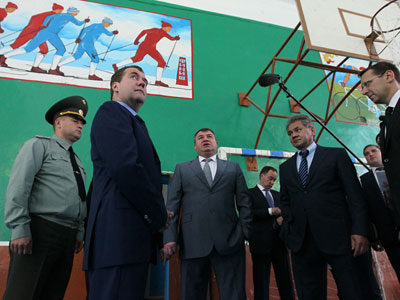
The Failure of Military Reform in Russia
Publication: Eurasia Daily Monitor Volume: 9 Issue: 123
By:

This week, Defense Minister Anatoly Serdyukov clashed with Prime Minister Dmitry Medvedev, publicly humiliating the former president. During a press-covered meeting of key cabinet ministers in a Soviet-built military residential neighborhood in the Moscow region (voenny gorodok Petrovskoye) Medvedev slammed the Defense Ministry for dragging its feet in resolving the problem of transferring surplus real estate to civilian control. Medvedev announced that someone must be fired in the Defense Ministry, but Serdyukov challenged the Prime Minister: “Then fire me.” Medvedev, who does not have the authority to oust Serdyukov, was forced to back off and demand that a solution to the problem be worked out by the Defense Ministry, Finance Ministry and Regional Development Ministry in five days (Interfax, June 26).
Military residential neighborhoods or voennye gorodoki were attached to military bases and run by the Defense Ministry, providing housing and social services to officers and families. Bases have been closed, but voennye gorodoki continued to exist, inhabited by retired officers, members of their families and, in some cases, their descendants. According to Serdyukov, out of some 7,500 voennye gorodoki today, 1,644 are not used by the active service military and should be handed over to local municipalities together with residents. But the municipalities do not want to take under their care the rundown military neighborhoods, demanding that leaky utilities and neglected housing must be first renovated. Medvedev visited Petrovskoye together with ministers and the new governor of the Moscow oblast, Sergei Shoygu, to demand swift action. But Serdyukov complained that budget allocations to run voennye gorodoki in 2012 have been depleted in the first six months of the year, and some 70 billion rubles ($2.2 billion) is needed to cover the deficit. Without the money to run essential services and utilities, the Defense Ministry cannot hand over the voennye gorodoki to local authorities (Kommersant, June 27).
After deciding last fall to step down to allow Vladimir Putin to retake the Kremlin, Medvedev has been experiencing an acute identity crisis. During a televised interview this month, Medvedev insisted: “I am not a technical prime minister” (Interfax, June 4). Medvedev has been stressing he is still an important person, though many in Russia question such an assessment. The Petrovskoye encounter this week seems to support the skeptics. Medvedev angrily scolded Serdyukov but was forced to back down in humiliation when the Defense Minister openly challenged the Prime Minister to accept his resignation or shut up. Serdyukov himself has earlier been reported to have asked to be relieved from running and reforming the Defense Ministry. Serdyukov was chief of the Federal Tax Service before becoming Defense Minister in 2007 and reportedly wanted to become a deputy prime minister in charge of federal finances (Vedomosti, April 23). But in a politically unstable situation in Russia, Putin seems to want to keep Serdyukov in charge of the military despite his own wishes or Medvedev’s displeasure.
Addressing military university graduates this week in the Kremlin, Putin declared that “Russia will never allow anyone to talk to it using the language of force” and will “adequately reply to any threats from wherever they come.” Putin announced that modernization of the armed forces and the “forming of their new outlook” will continue (RIA Novosti, June 28). Russian foreign and defense rhetoric after Putin’s return to the Kremlin has definitely hardened, but the actual capabilities of the military after almost four years of Serdyukov’s reforms are questionable.
The Russian Ground Forces (army) now have 85 newly formed brigades, including nine tank, 36 motor rifle, nine rocket and 12 artillery brigades. These units were intended to be at “permanent readiness” for combat deployment without the need to mobilize millions of reservists to fill the ranks. But a recently leaked Defense Ministry document, signed by Defense State Secretary Nikolai Pankin, discloses the real number of servicemen is much smaller than the officially declared target of one million. Last April, there were only 667,000 servicemen in the armed forces: 160,100 officers; 189,700 contract sergeants and privates; and 317,200 conscripts (Vedomosti, June 9). The are some 130,000 additional active service personnel in the Defense Ministry, with the overall number reaching some 800,000, according to the Duma defense committee (RIA Novosti, June 21). But these additional 130,000 are not combat personnel. They are made up of military university cadets and professors, with most of the others (about 100,000) being officers that retired their commission but did not officially leave active service because they are awaiting to be granted an apartment and receive other obligatory retirement benefits.
The 667,000 figure includes all the branches and departments of the military: the army, the navy, the air force, the space troops, the strategic rocket troops, the airborne corps and others. This leaves the newly formed “permanent readiness” army brigades crippled by undermanning, with most of them not ready to be used in combat as full units in any circumstances. Most of the soldiers are one-year serving conscripts, called up two times a year, so half of them at any moment have been serving less than 6 months – not yet trained to be battle-ready at all.
Serdyukov’s military reform has been radical, but it lacked a clear strategic objective or a defined doctrine. The United States and NATO continued to be the presumed main enemy; and the Defense Ministry made massive investments into new strategic nuclear weapons and air defenses. At the same time, attempts to meet all other possible threats resulted in thinly spreading out limited resources. Major military reform decisions have never been openly discussed in parliament or in the expert community. The cloak of almost total secrecy has led to costly mistakes and massive criminal misappropriations of resources (VPK, June 27).
To make conscript service more attractive, the feeding and maintenance of troops in barracks was mostly outsourced to private companies. This failed to prevent massive draft dodging. Experts wonder who will feed the soldiers if a unit is moved thousands of kilometers from its base into combat in some outlying region of Russia. Putin, speaking this week in the Federation Council, praised the outsourcing of troop maintenance: “If we call up for only one year, the soldiers must train and not spend time cleaning or cooking.” However, Putin added, “If it turns out that in Russia it does not work, we will terminate outsourcing” (RIA Novosti, June 27).
That is a fine example of how Serdyukov, under Putin’s command, is running the on again, off again, first bend and then mend military reform. It is no surprise Serdyukov wants to quit – either before the military collapses or the Defense Minister suffers a mental meltdown. But Putin does not grant a reprieve.




